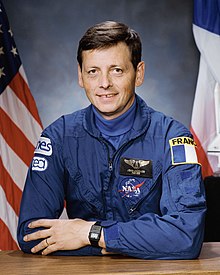Jean-Jacques Favier
| Jean-Jacques Favier | |
|---|---|
 |
|
| CNES Astronaut | |
| Nationality | French |
| Status | Retired |
| Born |
April 13, 1949 Kehl, Germany |
|
Other occupation
|
Engineer |
|
Time in space
|
16d 21h 48m |
| Selection | 1985 CNES Group 2 |
| Missions | STS-78 |
|
Mission insignia
|
|
Jean-Jacques Favier (Born April 13, 1949) is a French engineer and a former CNES astronaut who flew aboard the STS-78 NASA Space Shuttle mission. Favier was due to fly aboard the Columbia mission in 2003, but later signed out of the mission.
Born in Kehl, Germany, he later married Michèle Jean. They have four children. He enjoys downhill skiing, tennis, wind-surfing, and archeology.
Favier was the Advisor to the Director of the Material Science Research Center (CEREM) at the French Atomic Energy Commission (CEA) and was detached to CNES. He proposed the MEPHISTO program, a collaborative project between the French Space Agency and NASA, and has developed many other scientific projects in collaboration with the United States since 1985. He was the principal investigator for a MEPHISTO materials processing experiment, which made its debut on the United States Microgravity Payload in 1992 and 1994. He became a CNES payload specialist in 1985. He has been principal investigator of more than ten space experiments in collaboration with ESA, NASA, and the Russian Space Agency.
Favier was assigned as an alternate payload specialist on STS-65/IML-2, the second International Migrogravity Laboratory mission, and supported the mission as a Crew Interface Coordinator (CIC/APS) from the Payload Operations Control Center (POCC) at the Marshall Space Flight Center in Huntsville, Alabama.
Favier flew on STS-78 and logged over 405 hours in space. STS-78 Columbia (June 20 to July 7, 1996) was a 16-day Life and Microgravity Spacelab mission. It included studies sponsored by ten nations and five space agencies, was the first mission to combine both a full microgravity studies agenda and a comprehensive life science investigation, and served as a model for future studies on board the International Space Station. STS-78 orbited the Earth 271 times, covering 7 million miles in 405 hours, 48 minutes.
...
Wikipedia
